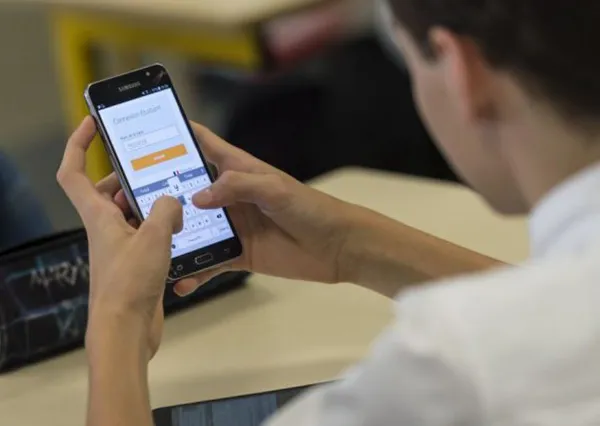Common Sense Media released the results of a national poll on the use of digital media for cheating in school.Revealed that more than 25% of teens admit to cheating with cell phones, and more than half admit to using the Internet to cheat.

More importantly, many students don't consider their actions to be cheating at all
National poll Reveals Students’ Attitudes Toward Hi-Tech Cheating and Highlights Need for parents and Educators to Set Guidelines and Address Consequences.
"The results of this poll should be a wake-up call for educators and parents," Cell phones and the Internet have been a real game-changer for education and have opened up many avenues for collaboration, creation, and communication.

But as this poll shows, the unintended consequence of these versatile technologies is that they've made cheating easier. The call to action is clear: parents and educators have to be aware of how kids are using technology to cheat and then help our kids understand that the consequences for online cheating are just as serious as offline cheating.

Kids have always found ways to cheat, but the tools they have today are more powerful than ever. In this poll, kids reveal that they're texting each other answers during tests, using notes and information stored on their cell phones during tests, and downloading papers from the Internet to turn in as their own work. Because the digital world is distant, hard to track, and mostly anonymous, kids are less likely to see the consequences of their online actions, especially when they feel they won't get caught.
- Cheating is a massive problem worldwide, especially for entrance exams for colleges, universities, professional training and the military.
- India's northernmost state, Jammu and Kashmir, is tackling the problem of cheating by installing 300 cellphone jammers at testing centers statewide.

One recent high-visibility case illustrates the problem
:- A student in India named Wasim Ahmed at Nawab Shah engineering college was caught cheating.
- He kept a smartphone in his underwear with a microphone in his shirt and a Bluetooth receiver in his ear.
- He whispered the questions to a confederate on the phone, who gave him the answers.
Behavior like Ahmed's is repeated around the world, though the specifics may vary.
The problem of using Internet-connected devices to cheat is so bad that Iraq actually turns off much of the nation's Internet to prevent sixth graders from cheating.

Internet-assisted cheating appears to be a major problem. But the real problem is that most exams are built around an antiquated concept of learning. If cheaters can cheat by getting data from the Internet, there's no reason to memorize that information in the first place.
We're all becoming information cyborgs, with instant, real-time information and communication, artificial intelligence bots, and all the world's knowledge at our fingertips at all times.
Meanwhile, our most advanced computers are no match for the human brain, and may never be, despite what the futurists are always telling us. Everyone will be far better off, and cheating will be obsolete, when we teach and test human creativity instead of human memorization.

Or, better yet, all exams should be "open smartphone" exams, where one's ability to use a smartphone to look up facts, details and answers is part of what's being tested. Because that's how the world works now. The students taking exams today will never live in a world without the mobile Internet.
When people use cellphone jammers gps, they're almost always trying to solve a problem that's different and much larger than the one they think they're solving.
The reality is that smartphones exist. Wireless communication exists. Access to the Internet from anywhere exists. And smartphones and wireless gadgets are quickly becoming universal and ubiquitous. The best solution to whatever societal problems these realities appear to create is rarely to simply block the phones.

The best solution to the problems created by technology is always better technology.
pervasive issue of high-tech cheating in schools, shedding light on the alarming statistics revealed by a national poll conducted by Common Sense Media. According to the poll, more than 25% of teens admit to cheating with cell phones, and over half admit to using the Internet for cheating purposes. What's concerning is that many students don't even perceive their actions as cheating.
urgent need for parents and educators to address this issue and establish clear guidelines regarding the ethical use of technology in academic settings. As technology continues to advance, cheating methods become more sophisticated. Students are leveraging the capabilities of cell phones and the Internet to cheat in various ways, such as texting answers during tests, accessing stored information on their devices, and downloading papers from the Internet to pass off as their own work.

The problem of cheating extends beyond individual classrooms and has significant implications for entrance exams in higher education, professional training, and even military examinations.
However, the root of the issue lies not just in the availability of technology but also in the outdated approach to testing and learning. With information readily accessible online, traditional exams that prioritize memorization are becoming obsolete. The article suggests that instead of focusing on memorization, exams should assess students' ability to utilize technology and apply knowledge creatively. In a world where smartphones and the Internet are omnipresent, it's crucial to adapt testing methods accordingly.
While these devices may seem like a quick fix, they fail to address the larger societal issues arising from the widespread use of technology.
Ultimately, the call to action is clear: educators, parents, and policymakers must collaborate to develop strategies that promote ethical technology use, foster critical thinking skills, and ensure academic integrity in the digital age.







